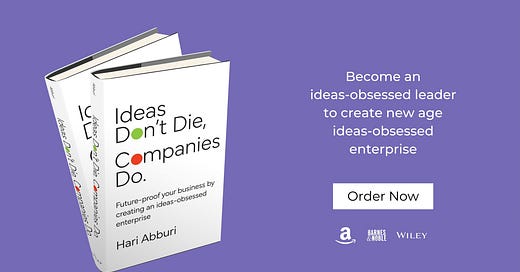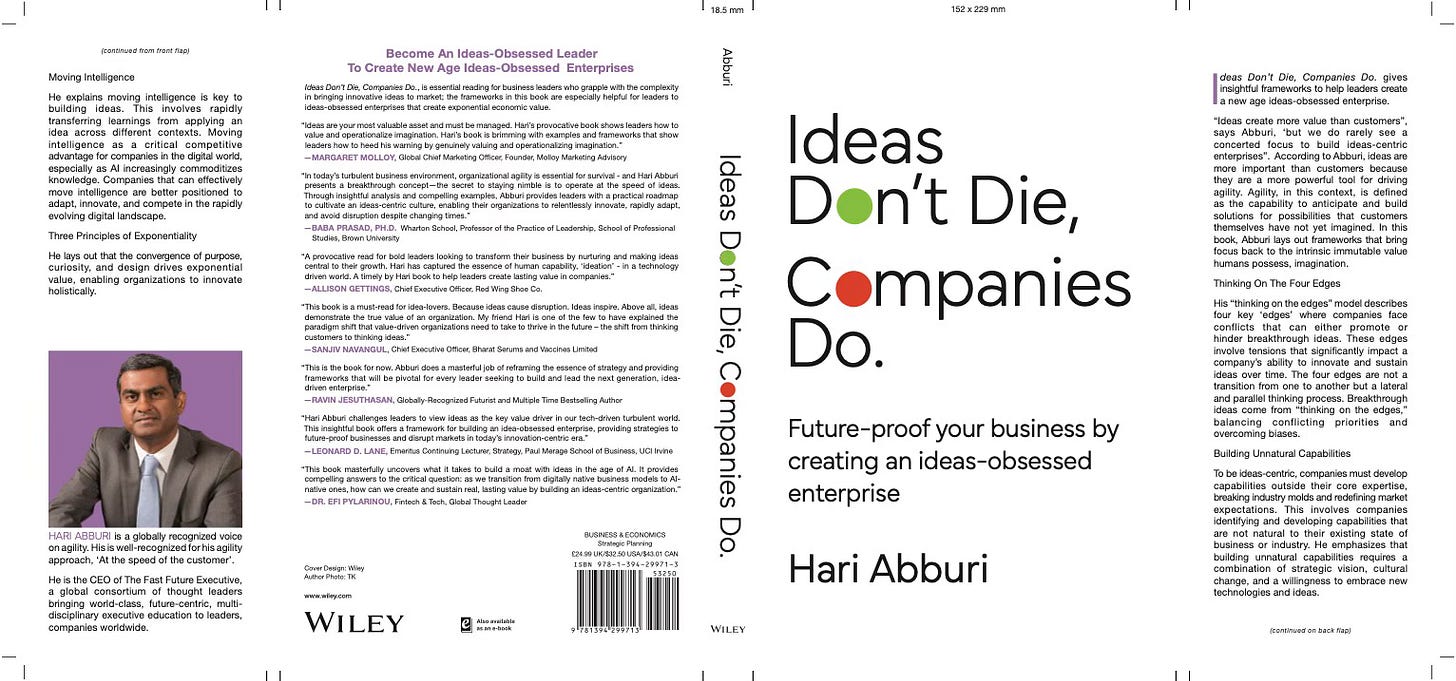Ideas Don't Die. Companies Do.
Pre-Order Your Copy Now!
Available in May 2025
Also On WATERSTONES | INDIGO | BOOK SHOP | TERTULIA
Rethink ideas as the real value to the future of your business in a technology-world where knowledge is increasingly a commodity
In Ideas Don’t Die, Companies Do, renowned voice on disruptive agility, Hari Abburi delivers an insightful framework for leaders to future proof their companies by creating an idea obsessed enterprise. In the book, you’ll learn why ideas are more important than customers to disrupt the industry and marketplace.
The author explains how to distinguish between ideas that are truly original and those that require strategic execution to differentiate them from other choices on the market. He offers key insights into how to glean information from other companies who have worked with the idea and how to apply that knowledge to your firm’s own idea.
Perfect for managers, executives, entrepreneurs, founders, and other business leaders, Ideas Don’t Die, Companies Do will also benefit product team leaders and other innovators with a desire to bring new and exciting ideas to the market.
Inside the book:
Explanations of the “idea moat” that creates exponential value at one company as opposed to another that uses similar ideas
Compelling answers to questions about idea timing, and why ideas that failed a few years ago can be successful today
How to shift your company’s focus from thinking customers to thinking ideas
Chapters:
Thinking on the Four Edges
Building Unnatural or Dissimilar Capabilities
Building and Moving Intelligence
The Three Principles of Exponentiality
Becoming An Ideas Leader
Praise For Ideas Don’t Die, Companies Do
Ideas Don’t Die, Companies Do., gives insightful frameworks to help leaders create a new age ideas-obsessed enterprise.
“Ideas create more value than customers”, says Abburi, ‘but we do rarely see a concerted focus to build ideas-centric enterprises”. According to Abburi, ideas are more important than customers because they are a more powerful tool for driving agility. Agility, in this context, is defined as the capability to anticipate and build solutions for possibilities that customers themselves have not yet imagined. In this book, Abburi lays out frameworks that bring focus back to the intrinsic immutable value humans possess, imagination.
Thinking On The Four Edges
His "thinking on the edges" model describes four key ‘edges’ where companies face conflicts that can either promote or hinder breakthrough ideas. These edges involve tensions that significantly impact a company's ability to innovate and sustain ideas over time. The four edges are not a transition from one to another but a lateral and parallel thinking process. Breakthrough ideas come from "thinking on the edges," balancing conflicting priorities and overcoming biases.
Building Unnatural Capabilities
To be ideas-centric, companies must develop capabilities outside their core expertise, breaking industry molds and redefining market expectations. This involves companies identifying and developing capabilities that are not natural to their existing state of business or industry. He emphasizes that building unnatural capabilities requires a combination of strategic vision, cultural change, and a willingness to embrace new technologies and ideas.
Moving Intelligence
He explains moving intelligence is key to building ideas. This involves rapidly transferring learnings from applying an idea across different contexts. Moving intelligence as a critical competitive advantage for companies in the digital world, especially as AI increasingly commoditizes knowledge. Companies that can effectively move intelligence are better positioned to adapt, innovate, and compete in the rapidly evolving digital landscape.
Three Principles of Exponentiality
He lays out that the convergence of purpose, curiosity, and design drives exponential value, enabling organizations to innovate holistically.












